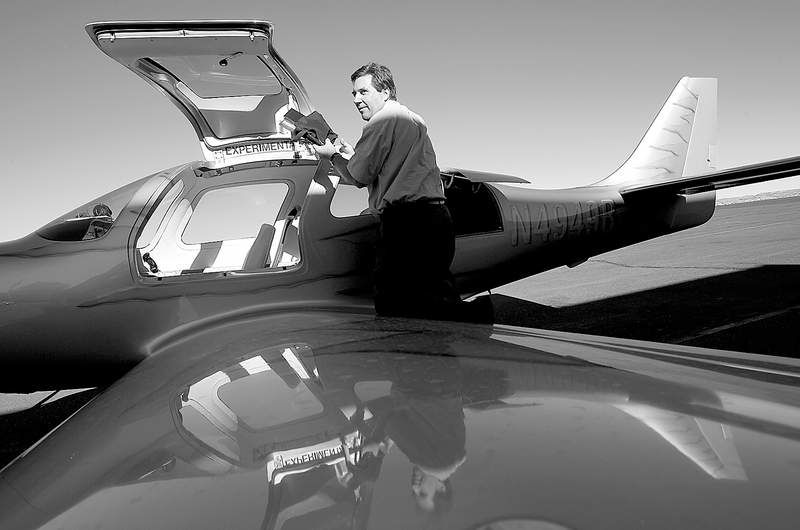FAA backs down on tougher regulations for kit planes
Published 4:00 am Wednesday, March 4, 2009

- Lancair ES Experimental aircraft owner Mike Newell built half of this kit plane on his own. The FAA has dropped a proposal, opposed by Sen. Ron Wyden, that would have required buyers to provide extensive evidence that they had built more than half of a kit plane from scratch.
WASHINGTON — Federal regulators have backed off of stringent rules for kit airplanes that threatened to crack down on Central Oregon’s home-built plane industry, Sen. Ron Wyden announced on Tuesday, following a meeting with Transportation Secretary Ray LaHood.
A final proposal is still being drafted, but Wyden, D-Ore., said LaHood endorsed a tentative agreement that would let kit plane companies operate under rules similar to those in place before the Federal Aviation Administration began writing a new policy last year.
“The FAA said they would accept some changes that would allow industry to move forward,” Wyden said in a phone interview immediately following his meeting. “We’re finally starting to see some change for the better.”
Central Oregon is home to two kit manufacturers: Bend’s Epic Aircraft and Redmond-based Lancair, which together employ about 225 people.
Epic and Lancair sell plane kits, which can be certified airworthy by the FAA if the owner builds least 51 percent of the aircraft. Customers are responsible for getting the planes certified by the FAA. This differs from manufacturers, whose planes are certified by the FAA before they’re sold.
In July, the FAA proposed a slew of new rules for kit planes, which are sold as parts and then assembled by individuals.
The new rules would have required buyers to provide photos, logs and even video evidence that they have built more than half of an airplane from a kit. They also would have required buyers to fabricate one-fifth of the plane’s parts from scratch, although the agency did not define what that means.
Now, the FAA has dropped that proposal, said Lancair owner Joe Bartels, who has met with federal officials as part of a rule-making committee for kits. In fact, the company likely won’t have to change its business at all to meet the tentative rules.
“They don’t want really any major changes,” Bartels said. “We will not have to modify the kits nor will we have to modify building procedure to show we are compliant with (FAA rules).”
FAA changes plans
Last year, FAA officials said kit planes made with composite materials and specialized tools violate the spirit of home-built plane rules, and the old system wasn’t designed with those technological advances in mind. Epic, in particular, had drawn the attention of regulators, for the sophistication of its planes and the fact owners had to perform some work at its facility in Bend.
Kit makers were “suffocating under bureaucratic FAA rules,” Wyden said of the agency’s crackdown on kit makers.
While he’s pleased with the ultimate result, the yearlong uncertainty about the future of kits hurt business, Bartels said.
“Lancair knows there were several sales lost as a result of the indecision,” Bartels said.
“At that time, everybody was thinking home-building might go away entirely,” said Gus Funnell of Van’s Aircraft, another kit plane manufacturer. “This is about as good as anybody could hope for.”
Details of the new rules weren’t available Tuesday, but officials at Lancair, Epic, Aurora-based Van’s Aircraft and Wyden’s office agreed the new FAA proposal would be largely similar to the current system. The changes include a more detailed inspection checklist and stricter enforcement of existing rules, they said. An FAA spokesman could not be reached late Tuesday afternoon.
An advisory committee is expected to release a final report on kit rules in July, with a final FAA order likely in September, Wyden said.
‘Our biggest advocate’
Bartels credited Wyden with pushing the FAA to reconsider its position.
“We’ve got to really say good things about Sen. Wyden — he was by far our biggest advocate,” Bartels said. “I’d like to also say the FAA worked well with industry and its members … and took into consideration fully the public comments.”
Epic Aircraft CEO Rick Schramek echoed that praise. He said Epic will also be able to continue business as usual under the proposed rules.
“I think we’re doing great,” Schramek said. “I don’t see any loss of jobs, and certainly Sen. Wyden did an incredible job in supporting the kit industry.”
Epic employs about 175 people in Bend, Schramek said, while Lancair has about 55 employees in Redmond and about 70 in a factory in the Philippines.






